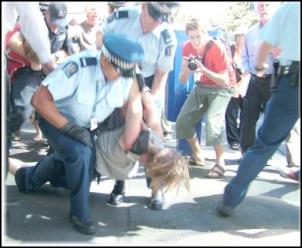Transaction Package and Paid Police Spies
Gordon Campbell On The Transition Package, And Paid Police Spies Within Protest Groups

The Transition Package
There is a striking lack of co-ordination between the existing benefit system and the government’s ‘worst case scenario’ transition package. Although the government expects 70,000 New Zealanders to lose their jobs during the next two years, its transition package offers – at best – only 16 weeks of support, and there are no plans in train to make the welfare safety net more available for people in desperate need.
In fact, the government disparages the very idea. At the Prime Minister’s press conference yesterday, Scoop asked Social Welfare Minister Paula Bennett whether she was looking at giving her departmental staff any more discretion in how they administer the Temporary Additional Support (TAS) measure for addressing hardship. No, she replied. The current rules would still apply, and in her view, this was no time to be ‘tinkering’ with the benefit system.
This is an unfortunate – and pretty stupid – response. Ever since the TAS replaced the Special Benefit in April 2006, it has been widely criticised here and here for being inadequate, and rigidly applied. As one advocacy group said at the time, the TAS amounted to an additional benefit cut by the Clark government to the ones enacted by Ruth Richardson : “This new mechanism for addressing hardship is deliberately designed to both provide less financial support than Special Benefit, and be less flexible than Special Benefit.”
What Bennett sees as ‘tinkering’ others would call a sensible, integrated plan. Preparatory work should be being done now to ensure that – when the crisis hits - the terms and conditions for the TAS can be relaxed so that families can put food on the table for themselves and their children.
In every other respect, the government’s response looks like tokenism. Sacked workers will qualify for only 16 weeks support, and then only if their redundancy package is less than $25,000. Individuals with more than $8,100 in the bank or couples with more than $16,200 between them will also not qualify The main components are a replacement for the loss of the Working for Families in-work tax credit, and an accommodation supplement of $100 at most. Plainly, such levels of support will not be meaningful enough to enable anyone to save their home. It looks more like a bit of bridging finance for a few weeks, until they can sell it.
Just as there is no co-ordination between the transition package and the benefit system at the bottom, there is no connection at the top between the package and a growth strategy to create jobs. Thus, we seem to be sleepwalking towards the biggest crisis since the 1930s Depression. More and more, this government seems to be in over its head.

At yesterday’s press conference, John Key ruled out the need for an inquiry into the use by Police of paid infiltrators within legitimate protest movements. Presumably, this means that the Police Complaints Authority is the only recourse now left open to the people who have been affected. Both the Prime Minister and Police Minister Judith Collins seem more than willing to take the Police at their word. If the Police are doing it, they must have their reasons, and so it must be alright. Yeah right.
According to the original Sunday Star-Times article, the Police informant Rob Gilchrist was getting $600 a week for his information. This is a substantial amount, and more than enough to entice anyone to manufacture information to keep the money coming in – and no surprise then that Gilchrist seems to have been active in promoting activities he could then inform on.
The incident raises an additional concern. A fee of $600 a week could well find takers among refugee communities and mosques in New Zealand, and any information manufactured in this context would have an extra dimension. Most social activists are New Zealand citizens, and so their immigration status is not at risk. That is not the case with many refugees and among some ethnic minorities. Recent arrivals from Islamic countries who may be attending mosques in New Zealand do not enjoy the protection of citizenship.
Therefore, there is genuine potential for dubious, paid information to be used secretly in decisions that affect immigration status. To date, there has been no more evidence of security risks emanating from mosques in New Zealand than there is from the environmental or social activist groups spied on by Rob Gilchrist. If the Police anti-terrorism unit is willing to spy on people exercising their right to freedom of protest, what is it doing to infringe on those exercising freedom of worship ?
What the incident exposes, above all else, is the lack of any meaningful oversight of our surveillance services. One might have thought that the Act Party would be fiercely opposed to surveillance intrusions by the nanny state on individual rights. But judging from its track record, the Act Party is concerned only with the freedom to do business, and not with the protection of privacy.
What is needed is an expanded and truly independent version of the Police Complaints Authority. It would be a start if Key and Collins could get beyond their perfectly circular reasoning – that if the Police are doing it, then by definition, their actions must be valid.
In our society, the Police and SIS should not be given carte blanche. They have been given extraordinary powers in order to combat genuine risks – but that means there is an onus of proof on them to demonstrate the risk is credible and substantial. It cannot be used as a license to bribe people to carry out fishing expeditions into the private lives and actions of citizens who have committed no crime, and who are engaged in legitimate protest action.


 Ramzy Baroud: Fighting Israel’s War In Jenin - Can The Palestinian Authority Be Saved?
Ramzy Baroud: Fighting Israel’s War In Jenin - Can The Palestinian Authority Be Saved? Binoy Kampmark: Far From Ignorant - The European Union, Arms Exports And Israel
Binoy Kampmark: Far From Ignorant - The European Union, Arms Exports And Israel Binoy Kampmark: Jimmy Carter, Israel And The Apartheid Question
Binoy Kampmark: Jimmy Carter, Israel And The Apartheid Question Richard S. Ehrlich: Pulverized By Asia's Tsunami
Richard S. Ehrlich: Pulverized By Asia's Tsunami Binoy Kampmark: Greenland Redux - Trump And America’s Continuing Obsession
Binoy Kampmark: Greenland Redux - Trump And America’s Continuing Obsession Ramzy Baroud: A Palestinian Year In Review - Genocide, Resistance And Unanswered Questions
Ramzy Baroud: A Palestinian Year In Review - Genocide, Resistance And Unanswered Questions